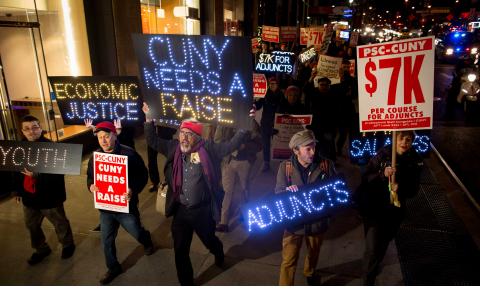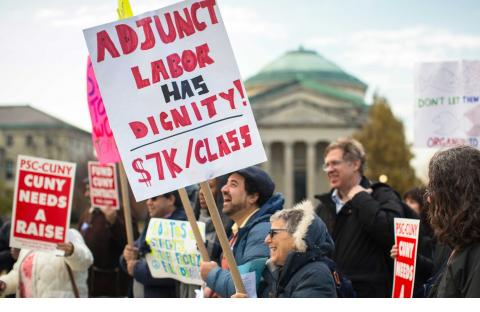 |
On December 4, as hundreds of PSC members chanted with illuminated signs at the Graduate Center, demanding a new contract for CUNY faculty and staff, several PSC members walked into the hearing room at Baruch College to give CUNY’s Board of Trustees a message that it was time for a new contract with the PSC.
That message wasn’t well received, it turned out. PSC First Vice President Mike Fabricant reported back to members gathered at Baruch College later that night, “We had 15 to 20 trustees who all looked down, looked away and they called an executive session to run away into a fortress of executive privilege. We wouldn’t let them, because we said, ‘What time is it?’”
To which the crowd responded, “Contract time!”
“It is their responsibility to deliver a contract that improves our working conditions and lifts the quality of education and learning conditions of our students,” Fabricant said of the trustees.
CONTRACT EXPIRED
The gathering at Baruch College was the culmination of a march by hundreds of faculty, staff, students and other labor supporters. The march started with a rally at the Graduate Center and ended at Baruch, in order to let CUNY know that the union was united and ready to fight for a new collective bargaining agreement.
The timing of the rally was no accident. The PSC contract with CUNY expired on November 30, and while the Triborough Amendment to the state’s labor code mandates that the contract’s provisions still govern faculty and staff until the next contract is settled, the message on the streets was that the campaign for a new contract had already begun.
NEW DEMANDS
 |
PSC delegates approved the new contract demands in mid-October. In terms of salary demands, the union is calling for 5 percent annual raises, an ambitious but necessary demand in a climate where the state has settled contracts with 2 percent annual raises with other public-sector unions. The PSC is demanding a step toward pay equity for adjunct faculty by calling for $7,000 per course per semester and is calling for the salary schedules for college laboratory technicians and the lecturer series to increase in addition to the across-the-board raises. The union also insists on more support for department chairs through either one of the following or a combination: an “additional salary or summer stipend, additional reassigned time, additional access to support personnel,” according to the stated demands.
“These demands will benefit not only faculty and staff, part-timers and full-timers, but these demands benefit CUNY students; these demands benefit the university,” said Andrea Vásquez, chair of the union’s higher education officer chapter. “We often see signs on the subway for CUNY celebrating the most successful students and the most distinguished and wonderful faculty members, which is great, but we know that it takes every one of us, it takes every faculty member and every staff member, part-timers and full-timers, to make this university what it is. And we all deserve the recognition and the compensation that these demands represent.”
The demand of “$7K” per course was a hallmark of the rally, which union officials noted was important not just for the part-time faculty but for all union members. “The gross underpayment of adjuncts undermines our entire profession,” said PSC President Barbara Bowen of current adjunct salaries. “As long as CUNY can get away with paying anyone $3,200 per course they believe they can do the same to any worker at the university. They set a new low.” She added that low adjunct pay “is a slap in the face to every student.”
Calling $7,000 per class per semester an ideal “baseline minimum wage” for adjuncts, Baruch College PSC Chapter Vice Chair Carly Smith said, “We say ‘no’ to the exploitation of part-time faculty at CUNY. We know it is unjust to stand by when our adjuncts – our brothers, sisters and siblings – teach the majority of classes [and] are making the average wage of fast-food workers. It is unsustainable for all of us when CUNY is funded by slashing full-time faculty positions in favor of paying the majority of adjuncts poverty wages. We know that an attack on faculty is an attack on the very core of public education.”
ACT LOCALLY
At the Baruch College rally, PSC Vice President for Part-Time Personnel Susan DiRaimo told the crowd that at present nearly 12,000 adjuncts teach a majority of classes at CUNY. “I was not a part-timer. I was a full-timer at part-time pay,” she said. “We only make $27,000 [with an eight-course load] a year, we’re making poverty wages, it’s time to change that and give us a living wage.”
She added, “Some adjuncts are even on food stamps. That is not fair.”
Before the rally, Distinguished Professor of Political Science and Sociology Frances Fox Piven told reporters that the PSC contract struggle was one of the many local fights she believes are part of a response to the corporate assault on working and poor people by the Republican-controlled federal government. “We’re going to draw strength especially from our universities, and our public universities,” she said.
The message of the union to the CUNY administration was manifold:
- The PSC will not wait several years for the administration to make an economic proposal as it did last time.
- Failure to meet the PSC’s demands would be an assault not just on CUNY’s faculty and staff, but an insult to CUNY students, the majority of whom are working class and people of color.
- The PSC will not settle for austerity wages. Students suffer from underfunding, and the university can only serve its students well if it invests in its faculty and staff.
- The PSC will push for economic gains for members in the most precarious and lowest-paid positions, among them adjuncts, college laboratory technicians and lecturers.
- The PSC made many gains in the last contract, and it will push to build on those gains, including the groundbreaking multiyear appointments for adjuncts.
LARGER CAMPAIGN
PSC members were joined and supported by more than 20 other unions, including the International Alliance of Theatrical Stage Employees, fast-food organizers from the Service Employees International Union, District Council 37, Actors’ Equity Association and the Retail, Wholesale and Department Store Union. The rally also received support from the CUNY Rising Alliance and from the Alliance for Quality Education, the Working Families Party and New York City Communities for Change.
The Manhattan march and demonstration was a follow-up to the union sending CUNY Board of Trustees Chairman William Thompson an official request to begin bargaining on November 20, about a month after the union’s delegates ratified the union’s official list of contract demands (the full list of demands was featured in the November 2017 issue of Clarion and is available on the PSC’s website). “While the CUNY board and administration may accept that austerity funding is good enough for our students, the members of the PSC do not,” Bowen said in her official request. “The contract proposals we have developed originate in an understanding that our working conditions are our student’s learning conditions.”
She stressed that the PSC contract demands are “about enhancing the quality of education for our students,” and that without making CUNY salaries and working conditions competitive with peer institutions, “CUNY suffers, and our students suffer.”
The action also came after a series of demonstrations demanding a fair contract around the university. At Lehman College in October, adjunct activists demonstrated in the main common area not only to highlight the demand for $7,000 per class per course for adjunct instructors but to link the demand with ongoing calls to make CUNY tuition-free.
“We can do it, the money is there,” Diane Auslander, an adjunct historian at Lehman, told Clarion. “There are ways CUNY can do both, there just needs to be the political will. That’s the hard part.”
Auslander said adjuncts around the university are bringing up the issue of inequity between adjuncts and full-time instructors in the classrooms, as many students are not aware of the financial hardships contingent faculty at CUNY often face. “It’s been in the news, we’re raising awareness all over the country,” Auslander said. “The PSC has to do what it has been doing: protest and put our issue in the face of the Board of Trustees.”
A CORE ISSUE
The struggle for adjunct equity has long been a central campaign for the PSC. In March, dozens of adjunct faculty members testified at a CUNY Board of Trustees hearing, describing the poverty they and their colleagues experience as a result of low pay at CUNY, and the negative impact that has on students’ learning conditions. In the last contract, the PSC won a groundbreaking pilot program establishing multiyear appointments for adjunct instructors, adding a layer of job security the union looks to build upon with this current contract campaign.
CAMPUS ACTIONS
Union members also staged contract campaign rallies at Hunter College, Bronx Community College and College of Staten Island on November 30, the day the previous contract expired. At the BCC protest, Joan Beckerman, an adjunct lecturer in sociology, said that even in a time of major cutbacks at the federal level it’s still possible for a union like the PSC to demand raises. “I don’t think it’s so audacious,” she said. “There’s money for war, to protect the president and for nuclear weapons.”
While CUNY Board of Trustees Chair William Thompson has yet to respond to Bowen’s letter, CUNY spokesperson Frank Sobrino said in an email after the December 4 rally, “The union will have an opportunity to make the case for higher pay during the next round of collective bargaining. We do not plan on negotiating in the press.”

